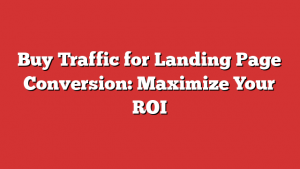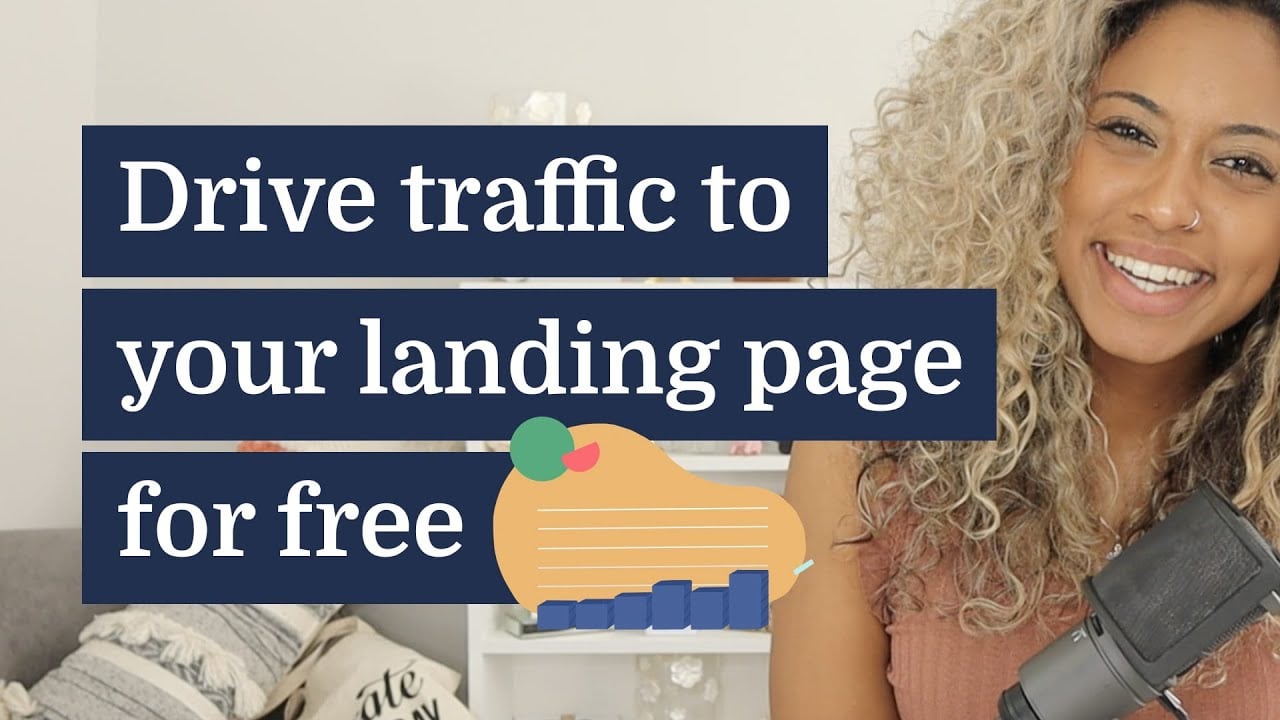Are you struggling to drive traffic to yourlandingpage?
In today’s competitive digital landscape, it’s essential to employ various strategies to grab the attention of your target audience.
From pay-per-click ads to content marketing, there’s a multitude of approaches to consider.
In this article, we will explore some effective techniques that will not only help you generate quality leads but also catapult your business to new heights.
So, if you’re ready to take your marketing efforts up a notch, keep reading to discover how to buy traffic for your landing page and boost your business’s online visibility.
| Item | Details |
|---|---|
| Topic | Buy Traffic for Landing Page Conversion: Maximize Your ROI |
| Category | Website Traffic |
| Key takeaway | Are you struggling to drive traffic to your landing page? In today's competitive digital landscape, it's essential to employ various strategies to grab the attention of your target |
| Last updated | December 29, 2025 |
landing-page">buy traffic for landing page
Buying traffic for a landing page involves various strategies such as pay-per-click (PPC) ads, organic search, social media, email marketing, and engaging with visitors on third-party channels.
The key to success lies in targeting the right audience, delivering on initial promises, and generating quality and quantity of inbound leads and customers.
Additionally, calculating the amount of traffic needed, conducting A/B and split testing for PPC landing pages, and focusing on social media platforms with the largest and most engaged following are crucial.
Content marketing, guest blogging, press releases, podcast appearances, and backlinks from HARO can further drive traffic.
Ultimately, email marketing plays a vital role in nurturing leads, while high-volume and relevant traffic sources are essential for the success of a marketing funnel.Key Points:
- Buying traffic for a landing page involves strategies such as:
- PPC ads
- Organic search
- Social media
- Email marketing
- Engagement on third-party channels
- Success in buying traffic depends on:
- Targeting the right audience
- Delivering on promises
- Generating quality leads and customers
- Important steps for buying traffic include:
- Calculating the necessary amount of traffic
- Conducting A/B and split testing for PPC landing pages
- Focusing on social media platforms with engaged following
- Additional strategies to drive traffic include:
- Content marketing
- Guest blogging
- Press releases
- Podcast appearances
- Backlinks from HARO
- Email marketing is crucial for nurturing leads, while high-volume and relevant traffic sources are necessary for a marketing funnel’s success.
Check this out:
? Did You Know?
1. Did you know that the term “buy traffic for landing page” originated in the early days of the internet, when website owners would actually purchase website visits to increase their site’s visibility?
2. In some cases, buying traffic for a landing page can lead to a phenomenon known as “click fraud,” where false or automated clicks are generated in an attempt to deceive the advertiser.
3. Did you know that one of the first websites to popularize buying traffic for landing pages was the online gambling industry? They recognized the value of attracting potential customers and boosting their website traffic.
4. Despite its popularity, research suggests that buying traffic for landing pages does not always guarantee increased sales or conversions. It is crucial to have a well-designed landing page with captivating content to truly engage visitors.
5. The concept of buying traffic for landing pages has evolved over time, and now businesses can utilize various platforms such as social media, search engines, and display advertising to reach their target audience effectively.
Buy Traffic For Landing Page – Pay-Per-Click (PPC) Ads
When it comes to driving traffic to your landing page, one of the most effective strategies is to invest in Pay-Per-Click (PPC) ads. With PPC ads, you are essentially buying traffic by paying for each click on your ads. This allows you to reach a wide audience and generate targeted traffic to your landing page.
One of the main advantages of using PPC ads is that you have control over your budget and can set specific targeting parameters to reach your desired audience. You can choose keywords, demographics, and locations to ensure that your ads are seen by the right people. By targeting the right audience, you increase the chances of converting visitors into leads and customers.
However, it is crucial to optimize your PPC ads to maximize your return on investment (ROI). This involves crafting compelling ad copy, using relevant keywords, and monitoring the performance of your ads. A/B and split testing can help you determine which ads are more effective and make necessary adjustments.
Key points:
- Invest in PPC ads to drive traffic to your landing page.
- Pay for each click on your ads to reach a wide audience.
- Control your budget and set specific targeting parameters.
- Choose keywords, demographics, and locations to target the right audience.
- Craft compelling ad copy and use relevant keywords.
- Monitor the performance of your ads and make necessary adjustments through A/B and split testing.
Blockquote: “Optimize your PPC ads to maximize your return on investment (ROI).”
Organic Search
While PPC ads can be an effective way to buy traffic, it is also important to rank organically in search results. When your landing page appears in organic search results, it means that it has been deemed relevant and valuable by search engines.
To increase your organic search visibility, you need to optimize your landing page for search engines. This involves using relevant keywords in your content, meta tags, and headers. You should also create high-quality, engaging, and informative content that encourages visitors to stay on your page and take action.
Apart from optimizing your landing page, building authoritative backlinks to your page is crucial for organic search success. This can be achieved through various strategies such as guest blogging, press releases, and engaging in industry-specific forums or online communities. These backlinks help search engines recognize the credibility and relevance of your landing page, leading to higher search rankings and increased organic traffic.
- Use PPC ads to buy traffic
- Rank organically in search results
- Optimize landing page for search engines:
- Use relevant keywords
- Include meta tags and headers
- Create high-quality, engaging, and informative content
- Build authoritative backlinks:
- Guest blogging
- Press releases
- Engage in industry-specific forums or online communities.
Social Media
Social media platforms have become powerful tools in driving traffic to landing pages. With millions of active users, platforms like Facebook, Instagram, Twitter, and LinkedIn offer ample opportunities to connect with your target audience.
This post updated with new ad network performance data.
To effectively leverage social media for traffic generation, it is essential to focus on platforms that have the largest and most engaged following in your niche. By sharing engaging and valuable content, you can attract users to your landing page. This content can include blog posts, infographics, videos, and other visually appealing materials that resonate with your target audience.
You can also run targeted social media ad campaigns to further amplify your reach. These campaigns allow you to select specific demographics and interests, ensuring that your ads are seen by people who are most likely to engage with your landing page.
Engagement is key on social media. Responding to comments, starting conversations, and sharing other relevant content can help increase your visibility and build a loyal following. By consistently engaging with your audience, you can drive more traffic to your landing page and build a community of loyal customers.
FAQ
How do I get traffic to my landing page?
To drive traffic to your landing page, it is essential to create compelling referral content. By crafting content that is valuable and engaging, it encourages readers to share it with others, thereby increasing the chances of driving traffic to your landing page. Additionally, launching email newsletters can be an effective method to attract traffic. Sending regular newsletters with informative and enticing content can grab the attention of subscribers, leading them to visit your landing page.
Another strategy is to guest blog on relevant sites. By contributing valuable content to websites that target a similar audience, you can tap into their existing traffic and redirect it to your landing page. Partnering with influencers in your industry is also an effective method to generate traffic. By collaborating with influencers who have a large and engaged following, you can leverage their influence to drive traffic to your landing page. Lastly, engaging in comment sections and forums related to your niche can help you build relationships with potential visitors. By offering valuable insights and engaging in conversations, you can establish credibility and attract interested individuals to your landing page.
What is a landing page for paid traffic?
A landing page for paid traffic is a targeted web page specifically designed for visitors who have clicked on a pay-per-click (PPC) advertisement. It serves as the first point of contact after users click on the ad. These landing pages are strategically created to optimize conversions and encourage visitors to take a desired action, such as making a purchase or filling out a form. By tailoring the landing page’s content, design, and call-to-action to align with the campaign’s ad, businesses can maximize the effectiveness of their paid traffic and increase the chances of achieving their desired goals.
The purpose of a PPC landing page is to engage visitors and provide them with relevant information that matches the ad that brought them there. It allows businesses to control the user experience, focusing solely on a specific product, service, or campaign. By eliminating distractions and creating a clear path to conversion, the landing page increases the likelihood of a successful outcome. These pages often include persuasive elements such as compelling headlines, targeted visuals, and concise information to capture the attention of the visitors and guide them towards the desired conversion.
Can I monetize a landing page?
Yes, monetizing a landing page can be accomplished through various strategies. One approach is to integrate advertisements on the landing page, providing relevant content that promotes products or services to generate revenue. Additionally, leveraging the emails collected from the landing page allows for further monetization opportunities. By regularly engaging with the email subscribers, you can offer exclusive paid content or promotional offers tailored to their interests. Another potential avenue is to combine affiliate marketing, where you earn a commission for any sales made through referral links, with the landing page to maximize revenue potential.
Can I link my landing page to my website?
Yes, you can absolutely link your landing page to your website. Landing pages serve as standalone pages that can be connected to your standard website pages or used independently. This means you have the flexibility to direct your website visitors to a specific landing page for targeted marketing campaigns or promotions, while still maintaining a seamless connection to your main website. By linking your landing page to your website, you can enhance user experience and effectively drive conversions for your business.
Buy Traffic • Self-Serve DSP Platform • Advertising Platform for Marketers • Programmatic Advertising • Native Ad Network











